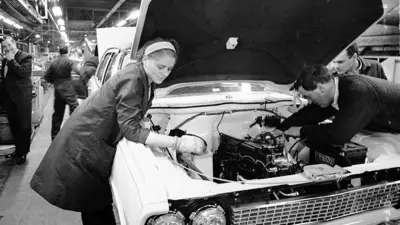We've updated our Privacy and Cookies Policy
We've made some important changes to our Privacy and Cookies Policy and we want you to know what this means for you and your data.
'Westminster must lead way on car smoking ban'
Top Stories
- Author, VIEWPOINT Dame Helena Shovelton
- Role, Chief Executive, British Lung Foundation
On Wednesday, Alex Cunningham, MP for Stockton North is due to table a Ten Minute Rule Bill proposing that smoking be banned in private vehicles when there are children present.
The children in Mr Cunningham's constituency are, like many across the country, at high risk from the dangers of passive smoking, with Stockton North ranking fifteenth in the UK according to British Lung Foundation research.
Mr Cunningham should be applauded for his concern on this serious health issue confronting children in Britain today.
Over 300,000 children in the UK present passive smoking related illnesses to their GP every year; an entirely preventable statistic that endangers the nation's future wellbeing, and presents a considerable expense to our healthcare service today.
Top Stories
Indeed, our nation's already-precarious healthcare budgeting would be much relieved if it did not have to factor in just under £10 million worth of primary care visits and asthma treatments, and just over £12 million in hospital admission costs, caused directly by passive smoking.
'Real concern'
Top Stories
The confines of a car, even with the window open, is one environment in which children can be exposed to seriously dangerous concentrations of passive smoke.
A study by Aberdeen University showed that smoking in a car exposes children to levels of smoke comparable to levels in a smoke filled pub.
Smoking in indoor public spaces is now widely perceived to be an unacceptable act, whether it is in an office, pub or train.
Should children, who have little or no influence on the actions of adults, potentially suffer a lifetime of respiratory problems, because we have chosen not to legislate to prevent smoking in the car when they are present?
If we are willing to protect adults in the workplace, then we should protect children from passive smoking when travelling in private vehicles.
Research by the British Lung Foundation shows there is a real concern among children, with 51% of 8 to 15 year-olds surveyed saying they have been exposed to cigarette smoke while they have been in the confines of a car and that almost a quarter were too embarrassed or scared to ask adults smoking in the car with them to stop.
Furthermore, 86% of the children surveyed said they would like to see smoking made illegal in the car when they are present.
Evidence from other countries shows that the extent to which education and awareness campaigns on their own achieve change is limited compared to what can be achieved when supported by legislation.
Encouraging signs
Professor John Britton, professor of Epidemiology and Public Health at Nottingham City Hospital, has in fact looked at the lessons learned in Canada, where a national media programme was supported by legislation in some states.
Data provided to Professor Britton demonstrates that states in Canada that implemented legislation on smoking in cars when children are present, saw a dramatic drop in exposure to smoke compared with states that just focussed on education and awareness campaigns.
In the United States, a nation where issues of individual liberty are hardly taken lightly, a number of states including California, Arkansas and Louisiana have concluded that the danger posed to a child's health through passive smoking in cars is of greater concern.
There have been some encouraging signs that this major public health issue is beginning to be taken seriously: The Chief Medical Officer for Wales, Dr Tony Jewell, said last November that it was "unfair for children to bear the brunt of other people's habits".
In addition the Health Department of Jersey is already considering passing the ban. It is now time for Westminster to take the lead in enacting legislative change in this vital aspect of child health so that we as a nation can set an example for countries throughout the world.
Top Stories
More to explore
Most read
Content is not available








